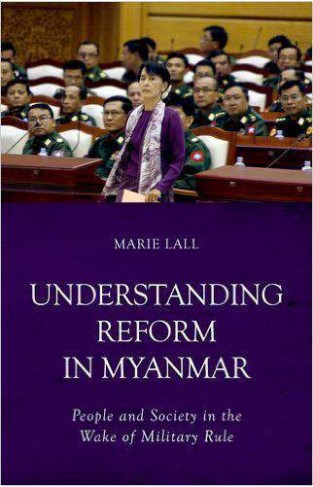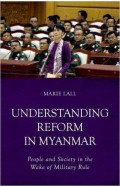Understanding Reform in Myanmar
By: Marie Lall
-
Rs 3,147.75
- Rs 6,995.00
- 55%
You save Rs 3,847.25.
Due to constant currency fluctuation, prices are subject to change with or without notice.
Marie Lall's book seeks to uncover and explain the recent political and economic reforms implemented in post-military Myanmar, focussing on key turning-points that ushered in the current transformation programme, particularly those affecting education, NGOs and social justice. She maps the main reform priorities, explaining how they are interconnected, and what has been achieved, which amount to the first tentative steps towards 'democratisation', albeit under the umbrella of President Thein Sein's controlled and more inclusive governance. Beyond the building site that is now Yangon, burgeoning urban car ownership and ubiquitous mobile phone use, there remains a widening gap, sharpened by inflation, between rural and urban Myanmar, at social, economic and political levels. Peasants are losing their livelihoods to development schemes that are being created to bring in foreign investment, and social justice is largely absent from the country's reform agenda. While the country has changed significantly, has the West been gulled into mistaking 'discipline-flourishing democracy' for true participatory democracy? Will the hopes of Aung San Suu Kyi coming to power in Yangon at the head of the NLD through an open and fair ballot ever be realised? These and other questions are scrutinised in this shrewd analysis of post-military Myanmar.
| Book | |
| What's in the Box? | 1 x Understanding Reform in Myanmar |
Marie Lall's book seeks to uncover and explain the recent political and economic reforms implemented in post-military Myanmar, focussing on key turning-points that ushered in the current transformation programme, particularly those affecting education, NGOs and social justice. She maps the main reform priorities, explaining how they are interconnected, and what has been achieved, which amount to the first tentative steps towards 'democratisation', albeit under the umbrella of President Thein Sein's controlled and more inclusive governance. Beyond the building site that is now Yangon, burgeoning urban car ownership and ubiquitous mobile phone use, there remains a widening gap, sharpened by inflation, between rural and urban Myanmar, at social, economic and political levels. Peasants are losing their livelihoods to development schemes that are being created to bring in foreign investment, and social justice is largely absent from the country's reform agenda. While the country has changed significantly, has the West been gulled into mistaking 'discipline-flourishing democracy' for true participatory democracy? Will the hopes of Aung San Suu Kyi coming to power in Yangon at the head of the NLD through an open and fair ballot ever be realised? These and other questions are scrutinised in this shrewd analysis of post-military Myanmar.
Zubin Mehta: A Musical Journey (An Authorized Biography)
By: VOID - Bakhtiar K. Dadabhoy
Rs 472.50 Rs 1,050.00 Ex Tax :Rs 472.50
The Origins of Political Order From Prehuman Times to the French RevolutioN
By: Francis Fukuyama
Rs 3,116.00 Rs 3,895.00 Ex Tax :Rs 3,116.00
Manning Up: How the Rise of Women Has Turned Men into Boys
By: Kay Hymowitz
Rs 646.75 Rs 995.00 Ex Tax :Rs 646.75
The Obama Syndrome: Surrender At Home War Abroad
By: Tariq Ali
Rs 1,036.00 Rs 1,295.00 Ex Tax :Rs 1,036.00
The Quest For Meaning: Developing A Philosophy Of Pluralism
By: Tariq Ramadan
Rs 1,116.00 Rs 1,395.00 Ex Tax :Rs 1,116.00
The Pakistan US Conundrum Jihadists The Military And The People The Struggle For Control
By: Yunas Samad
Rs 1,116.00 Rs 1,395.00 Ex Tax :Rs 1,116.00
An Enemy We Created: The Myth Of The Taliban Al Qaeda Merger In Afghanistan 19702010
By: Alex Strick van Linschoten
Rs 3,412.50 Rs 5,250.00 Ex Tax :Rs 3,412.50
WikiLeaks: Inside Julian Assanges War on Secrecy
By: David Leigh & Luke Harding
Rs 552.50 Rs 850.00 Ex Tax :Rs 552.50
No similar books from this author available at the moment.
No recently viewed books available at the moment.
Zubin Mehta: A Musical Journey (An Authorized Biography)
By: VOID - Bakhtiar K. Dadabhoy
Rs 472.50 Rs 1,050.00 Ex Tax :Rs 472.50













-120x187.jpg?q6)





-120x187.jpg?q6)



-120x187.jpg?q6)



